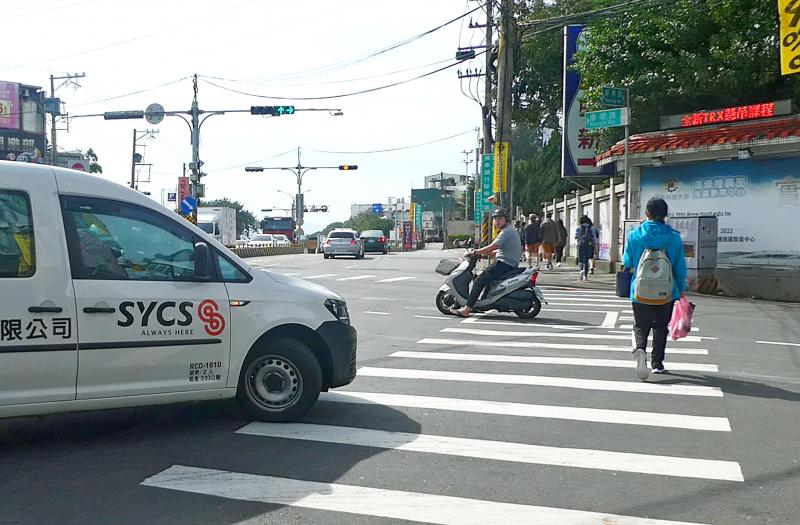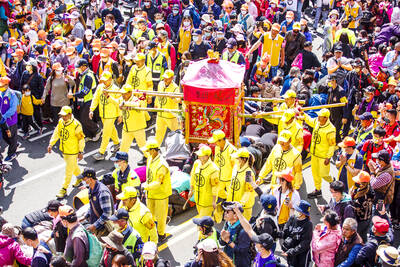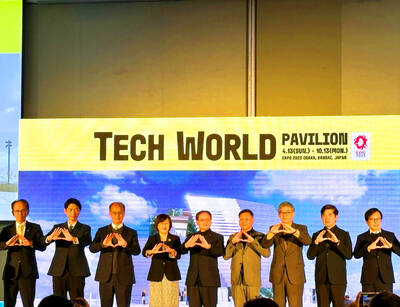To improve pedestrian safety, a set of draft amendments to the Road Traffic Management and Penalty Act was passed during a Ministry of Transportation and Communications (MOTC) review board meeting on Jan. 28.
Pedestrians have absolute right of way when walking on a crosswalk, but accidents still happen from time to time that involve injuries or even deaths caused by vehicles not stopping or giving way to pedestrians. Minister of Transportation and Communications Lin Chia-lung said that the MOTC hopes to make traffic more human-oriented, and cars and motorcycles should give way to pedestrians at intersections. It has long been said that vehicles should “politely“ give way to pedestrians, but in fact vehicles should always stop to let pedestrians go first unless there is a “no pedestrians“ sign.
Lin asked for the reform to start from the three aspects of “people, vehicles and roads” by enforcing the law that demands yielding to pedestrians at intersections, reviewing road design specifications, and planning to increase penalties, so as to increase drivers’ awareness of the need to give way to pedestrians.

Photo: Liao Hsueh-ju, Liberty Times 照片:自由時報記者廖雪茹
Regarding the increase in fines, the amendment refers to the laws of the US, Japan, France and South Korea. Drivers who do not allow pedestrians to pass first will be fined NT$1,200 to NT$6,000, increased from the current NT$1,200 to NT$3,600. Those who cause injury or death will bear both civil and criminal liability as well as facing a fine of NT$7,200 to NT$36,000.
Having been passed at the MOTC review board meeting, the draft amendments will now be transferred to the Legislative Yuan for review.
(Translated by Lin Lee-kai, Taipei Times)
為強化行人安全,交通部一月二十八日部務會報通過「道路交通管理處罰條例」修正案。
行人走在行人穿越道上擁有絕對通行權,但車輛因未停讓行人導致的傷亡事故仍時有耳聞。交通部長林佳龍表示,交通部希望落實人本交通,所以在路口汽機車應當禮讓行人;過去都是說「禮讓」,但事實上依法規範的話,如果沒有禁止行人標誌,就應該優先停讓。
林佳龍要求從人、車、路三方項著手,推動路口停讓行人大執法、檢討道路設計規範、規劃加重處罰等方式,來提醒車輛要停讓行人。
在提高罰鍰方面,參考美日法韓法規,未停讓行人先行通過者,罰鍰從現行一千兩百元至三千六百元,提高為一千兩百元至六千元;因而致人受傷或死亡者,除民刑事責任外,還可處七千兩百元至三萬六千元。
「道路交通管理處罰條例」修正草案在交通部務會報上通過後,將報行政院續轉立法院審議。
(自由時報記者鄭瑋奇、陳炳宏)

US President Donald Trump is taking a blowtorch to the rules that have governed world trade for decades. The “reciprocal’’ tariffs that he announced Wednesday last week are likely to create chaos for global businesses and conflict with America’s allies and adversaries alike. Since the 1960s, tariffs — or import taxes — have emerged from negotiations between dozens of countries. Trump wants to seize the process. “Obviously, it disrupts the way that things have been done for a very long time,’’ said Richard Mojica, a trade attorney at Miller & Chevalier. “Trump is throwing that out the window ... Clearly this is

The Matsu pilgrimage is one of Taiwan’s most iconic annual religious events. This grand occasion is more than just a religious ceremony; it deeply reflects Taiwan’s history and culture. Originally, Matsu was the goddess of the sea, primarily responsible for protecting fishermen and ensuring their safe voyage. As immigrants brought Matsu worship to Taiwan, she gradually evolved into a deity overseeing health, business, and various aspects of life. In times of uncertainty, Matsu has become a vital source of spiritual comfort for the Taiwanese. The pilgrimage represents Matsu’s annual tour to inspect her domain, driving away evil and bringing

A: The World Expo 2025 is set to open in Osaka, Japan, on Sunday, with 158 countries and regions and nine international organizations participating in the event. B: Wow, what’s the theme this time? A: The theme is “Designing Future Society for Our Lives.” B: Do you want to go? How long will it last? A: It’ll run for 184 days, until Oct. 13. Maybe we can go to Osaka during summer vacation. A: 2025年世界博覽會預計週日將在日本大阪開幕,158個國家或地區及9大國際組織將參與盛會! B: 哇這次的主題是什麼? A: 主題是:「創造閃耀生命光輝的未來社會」。 B: 你想要去嗎?展出多久啊? A: 世博會共展出184天到10月13日,或許我們暑假時可以去大阪玩。 (By Eddy Chang, Taipei Times/台北時報張迪)

A: The World Expo 2025 is about to open in Osaka. Is Taiwan going to participate in the event too? B: Sure, the Taiwan External Trade Development Council (TAITRA) will launch a Taiwan pavilion named “Tech World.” A: That sounds cool, and it can showcase our national strength in technology. B: The theme is “Connecting the world to create better future lives together.” The pavilion aims to attract over one million visitors. A: I hope humans can really create better future lives through this year’s fair. A: 2025年世博會即將開幕,這次台灣也會參加嗎? B: 當然啦,外貿協會的台灣館將以「Tech World」名義參展! A: 聽起來蠻酷的,應該是想強調台灣的科技實力。 B: 策展主題則是:「連結世界,共創未來美好生活」,希望能吸引到100萬人次參訪。 A: 希望藉由這次世博會,人類真的能共創美好生活。 (By Eddy Chang, Taipei Times/台北時報張迪)